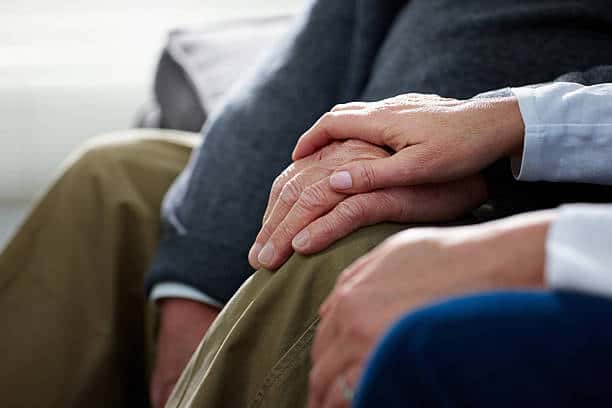Around 53,000 people in the Humber and North Yorkshire region are currently living with or beyond cancer. We are working together to improve the care and support people with cancer receive, to give them more control and help them to cope with their treatment and recovery.
This work is supported by offering personalised core care interventions such as:
- Holistic needs assessments
- Care plans
- Treatment summaries
- Health and wellbeing information
- Education and support
- Cancer care reviews

The Personalised Care programme supports people after treatment, ensuring everyone gets the most appropriate care for their needs. Find out more below.
Personalised Stratified Follow Up

Personalised Stratified Follow-Up (PSFU) is an effective way of certifying that care is adapted to ensure patients receive tailored post-treatment follow-ups. Each follow-up should:
- Meet the needs of the individual
- Enhance patient experience
- Improve quality of life
This includes ensuring each patients’ needs are met quicker, and that they are better informed about their disease, treatment, signs of recurrence and any longer-term effects.
PSFUs provide an increased focus on health and wellbeing, and ensure patients can make healthier lifestyle choices and manage their care better.
Trusts have implemented clinically agreed PSFU protocols and pathways for breast and colorectal cancer patients and are currently working towards PSFU for prostate cancer patients across Humber and North Yorkshire.
What are patients on a Personalised Stratified Follow-Up pathway offered?
- Information about signs and symptoms that could suggest their cancer has recurred or progressed
- Rapid access back to their cancer team, including telephone advice and support for concerns over symptoms (including those that may be due to possible side effects from treatment)
- Regular scans and/or tests, with quicker access to results
- Personalised care and support planning to enable patients to self-manage as appropriate and to improve health and wellbeing
Quality of Life Survey
The Cancer Quality of Life Survey is a national survey run by NHS England.
Recognising that quality of life outcomes are as important to patients as survival, this easy survey helps us to recognise how QoL may have changed for people diagnosed with cancer.
The survey will help to identify where care is working well, or not so well, and improve the way people are supported to live as long and as well as possible.
All cancer patients receive an invitation to complete the survey around 18 months after receiving their diagnosis.
More information about the Quality of Life survey
As an Alliance, we encourage as many people as possible to complete their survey so that the information we collect fully represents our cancer population.
The latest survey results were released in September 2023 and can be viewed here.
The Humber and North Yorkshire findings (as well as the national results) were encouraging, but there is an opportunity to reduce the gap in scores between those with a cancer diagnosis and the general population.
Personalised Core Care Interventions
Dr Dan Cottingham, Cancer Research UK GP Lead for Humber and North Yorkshire Cancer Alliance, provides information regarding Cancer Care Reviews in the above video.
Every person diagnosed with cancer will have access to personalised care, including needs assessment, a care plan and health and well-being information, as part of the NHS Long Term Plan for Cancer.
This includes:
Holistic Needs Assessment and Care Plan
A holistic needs assessment and care plan looks beyond a patient’s clinical needs to consider their emotional, practical, social, spiritual, financial and other needs, and how they can be met. A care plan is then drawn up to address them. It may include signposting to other organisations and support groups.
End of Treatment Summary
A treatment summary provides patients with information about their diagnosis, the treatment they have received, follow up, possible side effects of treatment, signs and symptoms to look out for and how to access rapid support etc when the treatment ends.
Cancer Care Review
Cancer Care Reviews take place in primary care to record a discussion between the patient and their GP / primary care nurse about their cancer journey. Reviews should take place within six months of diagnosis and provide an opportunity to discuss any concerns. If appropriate, referrals can be made to services, or patients can be signposted to information and support available in their community and from charities.
We’ve developed a Cancer Care Review pack to ensure the reviews GP practices carry out with their patients are as effective as possible.
Health and Wellbeing Support
Health and wellbeing information, education and support is provided to patients at the end of treatment. It helps them to access information about:
- Emotional support
- Coping with side effects
- Financial advice
- Getting back to work
- Making healthy lifestyle choices
Health and Well-Being Support
If you or someone you know has been diagnosed with cancer, information and support is available.
These are just a few of the many resources that can be accessed:
Macmillan Cancer Support
Macmillan Cancer Support offer free information and resources to support those affected by cancer.
Whether you need advice about treatment decisions, or would like to find out more about your medication - Macmillan can help.
Join their online community of over 80,000 members and connect with other people that have experienced cancer. The online forum is available 24 hours a day and offers a safe and supportive environment to all who need it.
Support Groups
Cancer support groups give you the chance to talk to other people in your area who can understand what you are experiencing.
Find out which support groups are available in the Humber and North Yorkshire area.
Joining a support group can be helpful at any point during your cancer journey. These groups give you an opportunity to talk openly and honestly about your feelings, and can help to reduce any feelings of loneliness or isolation you may be experiencing.
You CANcervive – Let’s Talk Cancer podcast
You CANcervive – Let’s Talk Cancer is a podcast which aims to:
- Encourage more open conversations about cancer
- Raise awareness around common signs and symptoms
- Educate people how to reduce their risk
This podcast was created by two people directly affected by cancer, Arzoo Dar from Dewsbury, who experienced bone cancer as a child, and Rob Husband from Huddersfield, who has had treatment for head and neck cancer.
The episodes are suitable for everyone, not just those who have experienced cancer personally.

